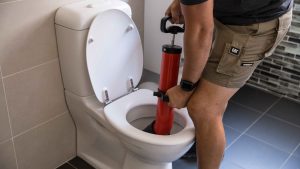How to prevent clogs in the kitchen and bathroom?
How to prevent clogs in the kitchen and bathroom
 Clogs can occur at the most unexpected times, and in the most unexpected parts of your home. While they are always annoying, they can be even more annoying in your kitchen, bathroom, or toilet. In this blog, we will give you tips on how to prevent and fix clogs in these important parts of your home.
Clogs can occur at the most unexpected times, and in the most unexpected parts of your home. While they are always annoying, they can be even more annoying in your kitchen, bathroom, or toilet. In this blog, we will give you tips on how to prevent and fix clogs in these important parts of your home.
Kitchen
The kitchen is the place where most food is prepared, and therefore also the place where most waste, grease, and oil is produced. As these substances cannot be drained through the sink, they often get stuck in the pipes and cause blockages. Here are some tips for preventing kitchen clogs:
- Do not pour grease, oil or other waste into the sink. Instead, use a paper towel to catch excess grease or oil and throw it away in the bin.
- Do not rinse vegetables or fruit in the sink. This can leave small pieces that get stuck in the pipes.
- Regularly clean your drains by rinsing them with boiling water. This will remove any accumulations of grease and oil and keep the drain flowing.
- Use a strainer over your drain to catch any bits of food before they get stuck in the pipes.
- Never use chemical unblockers. These can damage the pipes and harm the health of your household. Instead, use a mixture of baking soda and vinegar to dissolve blockages.
Bathroom
The bathroom is another important place where clogs are common. Hair, soap scum and toilet paper can easily get stuck in the pipes and cause clogs. Here are some ways to avoid bathroom clogs:
- Regularly remove hair from the drain of your shower or bathtub. To do this, use a hair screen or strainer that you place on top of your drain.
- Do not flush toilet paper or other materials that are not soluble in water down the toilet. This can cause blockages in your toilet and pipes.
- Do not use excessive amounts of toilet paper. Using too much toilet paper can cause blockages in your toilet and pipes.
- Do not use chemical cleaners in your drain. These can damage the pipes and harm the health of your household. Instead, use a mixture of baking soda and vinegar to dissolve clogs.
- Use a plunger to deal with small clogs in your bathroom. A plunger creates air pressure to move the water and remove the blockage.
WC
The toilet is an important part of your bathroom, but also one that can easily get clogged. Here are some tips to prevent clogs in your toilet:
- Never flush materials down the toilet that are not soluble in water, such as wipes or tampons. This can lead to blockages in the toilet and pipes.
- Do not use excessive amounts of toilet paper. Using too much toilet paper can lead to blockages in the toilet and pipes.
- Do not use chemical cleaners in your toilet. These can damage the pipes and harm the health of your household. Instead, use a mixture of baking soda and vinegar to dissolve blockages.
- Use a plunger to deal with small blockages in your toilet.
About our service Emergency Plumber Newcastle
Are you looking for a reliable and professional plumber who remove the clogs in the kitchen? Then look no further! Here at our Emergency Plumber Newcastle, we pride ourselves on providing high-quality services for all your plumbing needs. Our expert plumbers are ready to help you with any problem you may have. Whether you have a leaking tap, a blocked drain or need a complete plumbing renovation, we are here to help. We offer a fast and efficient service. Call us!
We collaborate with: Emergency Plumber Brighton, Emergency Plumbing London, Emergency Plumber 24h, Emergency Locksmith 24h, Emergency Plumber Wolverhampton and Emergency Electrician Bromley.
